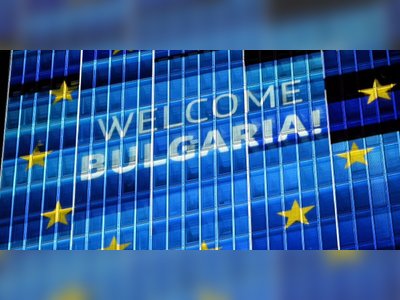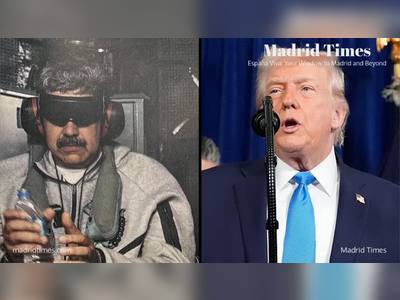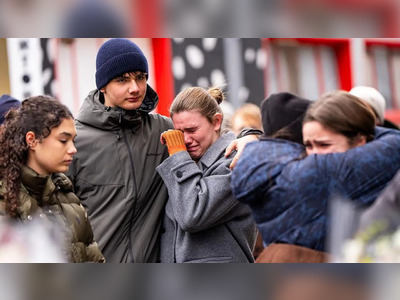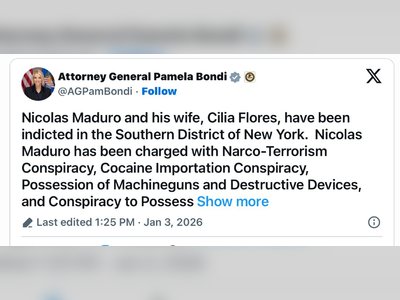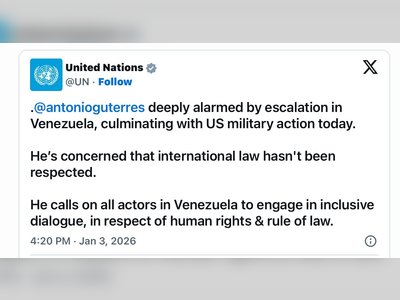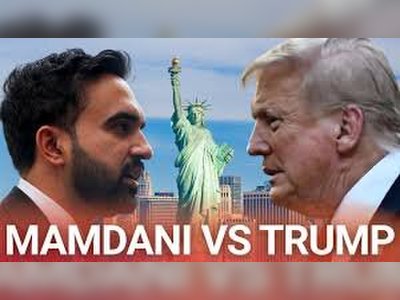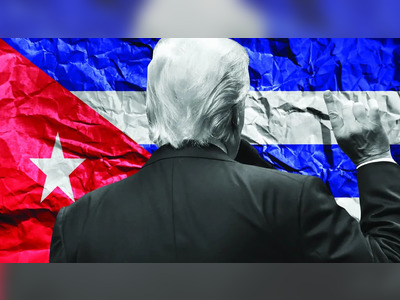Spain Confronts Franco's Legacy Amid Fears of a Resurgence of Autocracy
Prime Minister Pedro Sánchez warns against the dangers of fascism, aiming to educate younger generations and defend European institutions.
In a year marked by historical reflections and political challenges, Spain has embarked on a series of commemorative events under the banner of 'España en Libertad' to mark the death of the dictator Francisco Franco.
The initiative, driven by Prime Minister Pedro Sánchez, aims to educate the youth about the dark years of Franco's regime while warning against the potential resurgence of autocratic values both within Spain and across Europe.
On January 8, 2025, Sánchez expressed the urgent necessity of remembering the oppressive years of Franco’s dictatorship, amid rising concerns over authoritarianism in contemporary Europe.
'It can happen again,' Sánchez stated emphatically, urging democrats across the ideological spectrum to recognize and combat the threats to democracy.
This defense of democracy, according to Sánchez, needs to be vigilant against the nostalgia for authoritarianism often romanticized in some political quarters.
At an event attended by the entire Spanish cabinet, where the remix of JARCHA's anthem 'Libertad sin ira' set the tone, Sánchez outlined the government's dual objectives.
The initiatives aim to inoculate younger generations against the appeal of fascism, while simultaneously serving as a political pivot against criticism from Spain’s right-wing parties.
Sánchez’s warnings extended to the broader European context.
He singled out global figures like Elon Musk—whom he accused of undermining European institutions from a position of significant influence due to his association with the U.S. administration under Donald Trump.
Sánchez's rhetoric highlighted a Europe where 'reactionary international' forces were gaining ground, with fascist movements now established as formidable political forces.
The events, planned extensively throughout 2025, include academic seminars, film screenings, and interactive experiences like thematic escape rooms.
The purpose, as articulated by Carmina Gustrán, coordinator of 'España en Libertad', is to convey the values of democracy to a new generation for whom dictatorship is but a distant and often misunderstood chapter of history.
Simultaneously, as Spain grapples with its past, a large Venezuelan diaspora in Madrid expressed vehement opposition to Venezuelan President Nicolás Maduro.
Thousands of Venezuelan expatriates gathered at Puerta del Sol, endorsing opposition figure Edmundo González as the legitimate leader amid Maduro's contested reelection.
This demonstration, endorsed by prominent Spanish political figures such as Alberto Núñez Feijóo and Isabel Díaz Ayuso, underscored the intersection of historical reflection and current political climates in different parts of the world.
Feijóo, leading the Partido Popular, criticized the Sánchez government for its handling of foreign policy relating to Venezuela, arguing for a unified defense of democratic principles globally and lamenting the absence of official Spanish governmental support for the opposition in Venezuela.
Ayuso was similarly vocal, questioning the morality of condemning past dictatorships while allegedly ignoring current ones.
Across Spain, cities like Barcelona and Valencia saw similar demonstrations, with Venezuelans and their supporters calling for democratic change in their homeland.
The protests resonate deeply with Spain’s internal debates over authoritarian legacies and democratic values, serving as a stark reminder of the ongoing global battle for political freedoms.
As Spain moves through 2025, the year signifies not just an opportunity for historical reckoning but also a reflection on the vitality of democratic institutions and values in the face of global autocratic pressures.
The initiative, driven by Prime Minister Pedro Sánchez, aims to educate the youth about the dark years of Franco's regime while warning against the potential resurgence of autocratic values both within Spain and across Europe.
On January 8, 2025, Sánchez expressed the urgent necessity of remembering the oppressive years of Franco’s dictatorship, amid rising concerns over authoritarianism in contemporary Europe.
'It can happen again,' Sánchez stated emphatically, urging democrats across the ideological spectrum to recognize and combat the threats to democracy.
This defense of democracy, according to Sánchez, needs to be vigilant against the nostalgia for authoritarianism often romanticized in some political quarters.
At an event attended by the entire Spanish cabinet, where the remix of JARCHA's anthem 'Libertad sin ira' set the tone, Sánchez outlined the government's dual objectives.
The initiatives aim to inoculate younger generations against the appeal of fascism, while simultaneously serving as a political pivot against criticism from Spain’s right-wing parties.
Sánchez’s warnings extended to the broader European context.
He singled out global figures like Elon Musk—whom he accused of undermining European institutions from a position of significant influence due to his association with the U.S. administration under Donald Trump.
Sánchez's rhetoric highlighted a Europe where 'reactionary international' forces were gaining ground, with fascist movements now established as formidable political forces.
The events, planned extensively throughout 2025, include academic seminars, film screenings, and interactive experiences like thematic escape rooms.
The purpose, as articulated by Carmina Gustrán, coordinator of 'España en Libertad', is to convey the values of democracy to a new generation for whom dictatorship is but a distant and often misunderstood chapter of history.
Simultaneously, as Spain grapples with its past, a large Venezuelan diaspora in Madrid expressed vehement opposition to Venezuelan President Nicolás Maduro.
Thousands of Venezuelan expatriates gathered at Puerta del Sol, endorsing opposition figure Edmundo González as the legitimate leader amid Maduro's contested reelection.
This demonstration, endorsed by prominent Spanish political figures such as Alberto Núñez Feijóo and Isabel Díaz Ayuso, underscored the intersection of historical reflection and current political climates in different parts of the world.
Feijóo, leading the Partido Popular, criticized the Sánchez government for its handling of foreign policy relating to Venezuela, arguing for a unified defense of democratic principles globally and lamenting the absence of official Spanish governmental support for the opposition in Venezuela.
Ayuso was similarly vocal, questioning the morality of condemning past dictatorships while allegedly ignoring current ones.
Across Spain, cities like Barcelona and Valencia saw similar demonstrations, with Venezuelans and their supporters calling for democratic change in their homeland.
The protests resonate deeply with Spain’s internal debates over authoritarian legacies and democratic values, serving as a stark reminder of the ongoing global battle for political freedoms.
As Spain moves through 2025, the year signifies not just an opportunity for historical reckoning but also a reflection on the vitality of democratic institutions and values in the face of global autocratic pressures.
Translation:
Translated by AI
AI Disclaimer: An advanced artificial intelligence (AI) system generated the content of this page on its own. This innovative technology conducts extensive research from a variety of reliable sources, performs rigorous fact-checking and verification, cleans up and balances biased or manipulated content, and presents a minimal factual summary that is just enough yet essential for you to function as an informed and educated citizen. Please keep in mind, however, that this system is an evolving technology, and as a result, the article may contain accidental inaccuracies or errors. We urge you to help us improve our site by reporting any inaccuracies you find using the "Contact Us" link at the bottom of this page. Your helpful feedback helps us improve our system and deliver more precise content. When you find an article of interest here, please look for the full and extensive coverage of this topic in traditional news sources, as they are written by professional journalists that we try to support, not replace. We appreciate your understanding and assistance.

